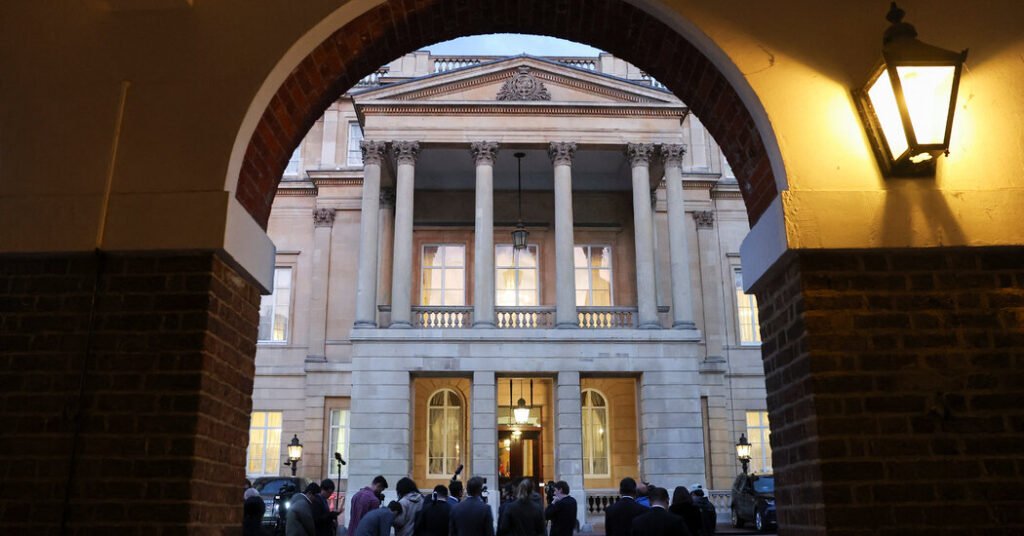Officials from the United States and China announced on Tuesday that they have decided to ease some of the economic restrictions they imposed on each other, aiming to return to a trade agreement established in May.
Following two intense days of discussions in London, key economic representatives from both nations are set to share the new “framework agreement” with their leaders, President Trump and China’s Xi Jinping, for their final approval.
Though the complete details of the agreement were not disclosed immediately, it seeks to restore the trade relationship to the conditions earlier agreed upon in Switzerland. This arrangement had started to break down recently as China maintained its limitations on exporting essential rare earth minerals and magnets necessary for U.S. manufacturers.
Commerce Secretary Howard Lutnick, who participated in the negotiations, informed reporters in London that the U.S. concerns regarding China’s export limitations on minerals and magnets had been addressed. He also indicated that the U.S. would reverse its own measures taken in response to these Chinese restrictions in a “balanced manner.”
In recent weeks, U.S. officials attempted to pressure China by restricting the export of various American products and technologies, including chemicals, aircraft parts, and software, and even suggested barring Chinese students from U.S. universities.
An insider who was not authorized to speak publicly mentioned that China has agreed to begin shipping rare earths to the U.S., while the U.S. will concurrently ease its export controls on Chinese goods that were set post-Geneva.
Mr. Lutnick, alongside U.S. Trade Representative Jamieson Greer and Treasury Secretary Scott Bessent, will update Mr. Trump about the deal on Wednesday, as noted by the source.
“We certainly believe that the matters concerning rare earth minerals and magnets in relation to the United States will be resolved under this framework,” Mr. Lutnick stated.
Mr. Greer, who was involved in the discussions, mentioned that both parties would keep in regular touch to address ongoing economic disputes. However, he confirmed that no further meeting had been scheduled yet.
The discussions took place at Lancaster House in London, near St James’s Palace, with the aim of reviving their trade truce. The conversations stretched late into the night, with moments of tension suggesting they could collapse, according to the insider.
Last week, Mr. Trump had a 90-minute phone conversation with Mr. Xi, marking the first direct dialogue between the two leaders since Trump resumed office in January.
An agreement for a 90-day halt on certain tariffs that was made in Geneva will expire in August. Mr. Greer mentioned that both parties were “motivated,” but it would ultimately be Mr. Trump’s decision to extend the pause as negotiations progressed.
He also remarked that discussions about a larger trade deal were introduced, but the focus of the current meetings is to implement agreements reached in Geneva and during the recent call between the leaders.
China’s state news agency, Xinhua, released a cautious statement saying the two sides had agreed “in principle,” a phrase often used to indicate that not everything has been finalized. According to Xinhua, the talks were “professional, rational, in-depth, and candid,” with “candid” often used by state media when significant disagreements have occurred.
The announcement from both countries came just before the Trump administration secured a significant legal victory regarding its tariffs.
In Washington, a federal appeals court permitted Mr. Trump on Tuesday to uphold many of the tariffs that a lower court had ruled to be unlawful in late May. This stay preserves a key element of the president’s trade policy while federal attorneys negotiate with states and businesses claiming they were harmed due to tariffs that lacked proper legal authority.
U.S. officials indicated that the court’s tariff rulings were not discussed during the talks with China.
Mr. Bessent, who headed the American delegation, departed the negotiations late Tuesday to return to Washington for congressional hearings scheduled for Wednesday. On the Chinese side, the economic policy discussions were led by Vice Premier He Lifeng.
America’s reliance on China for rare earth metals provides Beijing with substantial leverage to influence the U.S. economy. After Mr. Trump increased tariffs on Chinese products in April, China responded by tightening its export controls on critical minerals and magnets, posing a threat to U.S. manufacturers and defense contractors.
The United States operates a single rare earth mine in Mountain Pass, California, and has limited capabilities to process these metals into necessary chemicals and subsequently into magnets. This issue prompted U.S. officials to engage with Chinese negotiators in Geneva last month.
However, following that meeting, Trump administration officials expressed disappointment when they saw that Chinese shipments of rare earth minerals and the related magnets continued to be infrequent. They accused China of breaching the Geneva agreement.
To compel China to lift its export restrictions, U.S. officials imposed limits on the export of various American products and technologies to China, such as semiconductor production software, gases including ethane and butane, and components for aerospace and nuclear systems. They also suggested restricting the enrollment of Chinese students.
It remains uncertain whether the latest framework will be effective, and experts are doubtful about the likelihood of a more comprehensive agreement being reached soon.
“While two days of discussions are better than nothing, we have seen prolonged negotiations in the past that haven’t yielded much,” noted Henrietta Treyz, director of economic policy at Veda Partners, in a research note. “Much of the time is consumed in translation, confirming meanings, and reiterating key points, all of which prolong the talks and mostly maintain the existing conditions, which appears to be the outcome from London.”
Keith Bradsher contributed reporting from Beijing, and Tony Romm from Washington.


